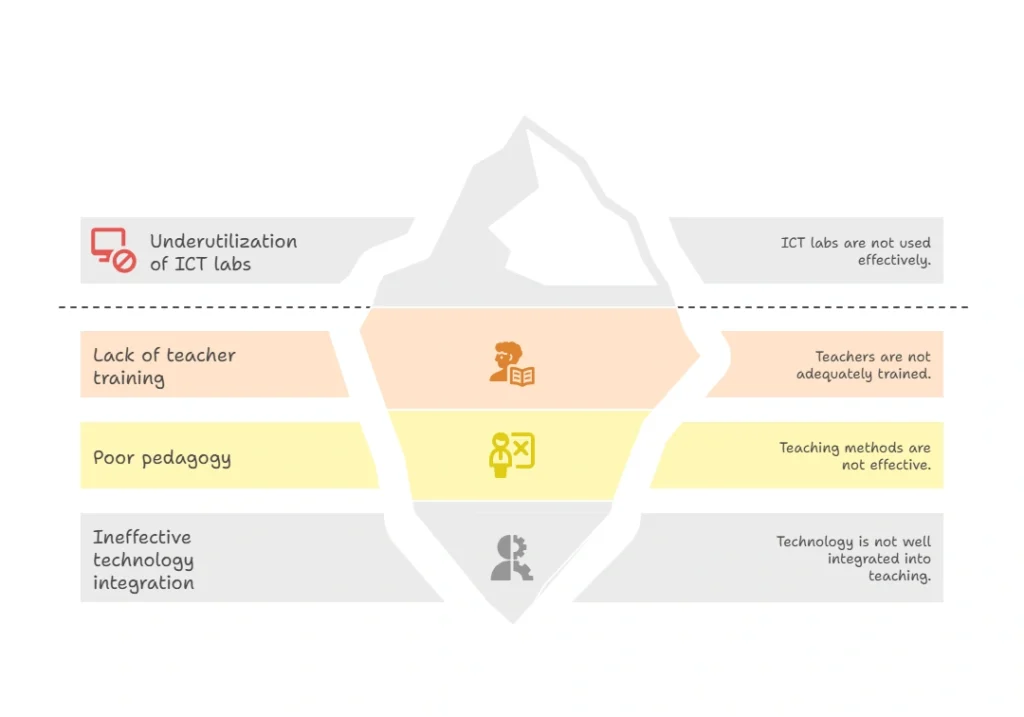Paper: GS – II, Subject: Society and Social Justice, Topic: Social Sector- Education, Issue: Bridging learning gaps.
Context:
India aims to become a developed nation by 2047, and this depends heavily on strengthening human capital through quality education. Despite several reforms (NEP 2020, NIPUN Bharat), learning gaps persist, especially post-pandemic as highlighted by ASER, PARAKH,
Key Highlights:
Role of ICT in Education:
- Existing ICT Infrastructure: Over 1.2 lakh secondary schools equipped with ICT labs used mostly for basic digital skills and not for core academic learning.
Potential Benefits:
- Cost-effective, scalable, and already available.
- Can support personalized learning via AI-based PAL (personalized adaptive learning) systems.
Case study:
- Independent Evaluations: Andhra Pradesh program & NITI Aayog ICT pilot showed learning gains equivalent to 0.9 to 2.5 additional academic years.
- Rajasthan: Learning outcomes increased by 27% within two years.
- Effectiveness: Students benefitted from differentiated learning aligned with their own pace and level.
Learning Gaps in India:
Systemic Issues:

Measures for Integration:
- Vision and Alignment:
- ICT labs must be seen as core to learning, not just infrastructure.
- Push for coordinated effort from teachers, bureaucrats, and policymakers.
- Procurement Reform:
- Focus on high-quality educational software and long-term support.
- Avoid one-time procurement without follow-up training or monitoring.
- Teacher Involvement:
- Payment structures linked to outcomes (as done in NITI Aayog pilots).
- Create incentives for teachers to collaborate with tech solutions.
- Maximize Use of ICT Labs: Integrate them into daily classroom learning, not just digital literacy sessions.
- Expand Personalized Learning Tools: Scale AI-based PAL content for adaptive and efficient learning in government schools.
- Strengthen Public-Private Partnerships (PPPs): Leverage private expertise in ed-tech to improve digital learning delivery.
- Focus on Foundational Literacy & Numeracy (FLN): Use digital platforms to support the NIPUN Bharat goals effectively.
Conclusion:
India already has a strong digital foundation in schools. Leveraging ICT smartly can be the most impactful step in bridging the learning gap and building a knowledge-based society.
La Excellence IAS Academy, the best IAS coaching in Hyderabad, known for delivering quality content and conceptual clarity for UPSC 2025 preparation.
FOLLOW US ON:
◉ YouTube : https://www.youtube.com/@CivilsPrepTeam
◉ Facebook: https://www.facebook.com/LaExcellenceIAS
◉ Instagram: https://www.instagram.com/laexcellenceiasacademy/
GET IN TOUCH:
Contact us at info@laex.in, https://laex.in/contact-us/
or Call us @ +91 9052 29 2929, +91 9052 99 2929, +91 9154 24 2140
OUR BRANCHES:
Head Office: H No: 1-10-225A, Beside AEVA Fertility Center, Ashok Nagar Extension, VV Giri Nagar, Ashok Nagar, Hyderabad, 500020
Madhapur: Flat no: 301, survey no 58-60, Guttala begumpet Madhapur metro pillar: 1524, Rangareddy Hyderabad, Telangana 500081
Bangalore: Plot No: 99, 2nd floor, 80 Feet Road, Beside Poorvika Mobiles, Chandra Layout, Attiguppe, Near Vijaya Nagara, Bengaluru, 560040
